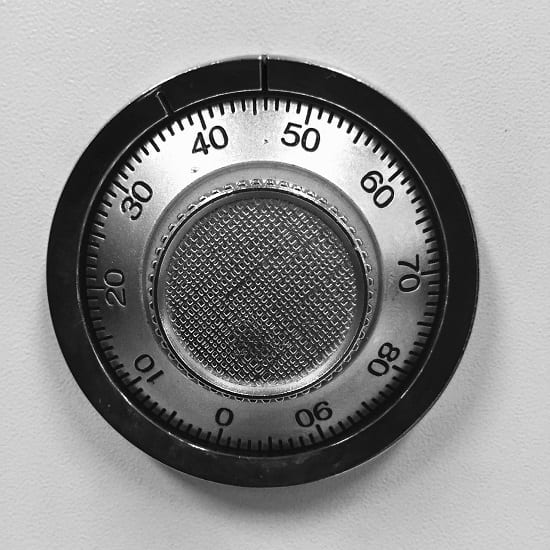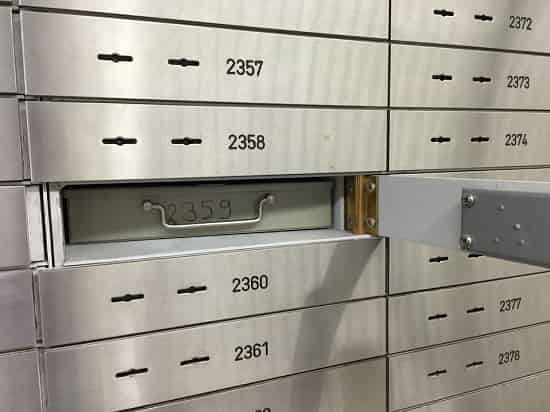Gold Storage: Which Option Is Right For You?
09/03/2023Daniel Fisher
Free & fully insured UK Delivery. Learn more
Secure & flexible payments. Learn more

Buyback Guarantee Learn more
When you invest in gold and other precious metals, you need to know that you can find a storage solution that you can rely on. We’ve put together a detailed guide to help you store your gold with total confidence, while also allowing you quick delivery in case of a full or partial sale.
Gold is a precious metal, which is highly sought after and isn’t so easy to trace if it disappears. That’s why wherever you store your gold, you should make sure it’s stored securely, and out of sight; especially since recent research has uncovered that when the price of gold rises, so does the number of burglary attempts.
There are several different options to consider when it comes to storing bullion. Some people prefer to store their gold at home. This option allows you access to your gold at all times, but you need to take security into account. Even if you have a home safe, your gold and silver will never be as secure in your home as they would be in a specially-designed secure storage facility.
Others decide to store their bullion in a safety deposit box at their bank or 3rd party facility. The clear advantage to this over home storage is the added security, but banks can be a little limiting. You’ll only be able to access your gold when the bank is open and someone is available to open the vault for you. This could be a risk if you keep one eye on the market and need to be able to sell your assets quickly.
Plus, you should note that you will need to take responsibility for insurance yourself if you have stored bullion in a bank’s vaults, as they are not legally allowed to know what stored items are in your safe deposit box.

Storing your gold at home is what a lot of smaller gold investors choose to do, especially when choosing to invest in gold coins. There are a number of ways that you can store your gold at home for those looking to keep their gold close at hand:
While we would recommend secure vault storage for most physical gold customers, there are a number of advantages you can obtain from home storage.
While storing your gold at home definitely scores highly for convenience factor, there are a number of drawbacks.

There are two types of safety deposit boxes. Those offered for years at high street banks and a select number of private facilities provided near city centres.
Storing your gold at the bank sounds like the safest place you could possibly store gold, and it’s true it has great security benefits. There are however a number of considerations you need to have in mind if taking this option:

Alternatively, if you want the benefits of the added peace of mind that come with a bank, but you want to know that your bullion is fully insured and specially handles, then you should think about taking advantage of vaulted storage. You really can’t put a price on peace of mind, especially when it comes to large investments. Many gold dealers provide storage options as part of their services. There are several benefits to vaulted storage for account holders, so let’s break them down.
The main benefit of this type of storage is the security that it offers. Any good dealer will use top-of-the-line facilities that are specifically designed to keep high-value items secure. If you are looking for storage options that you can trust and that will minimise risk, this should be at the top of your list.
You may want to look for dealers that use Loomis vaults, which have a long and storied history that dates back to the gold rush. Their multi-layered security system is world-renowned when it comes to the best ways to protect your gold, silver, and any other precious metal you can name.
Such specialist facilities store gold and silver for many banks and institutions, which is great validation of their service. If it’s good enough for the massive organisations, then it’s good enough for us!
One of the most significant risks of storing bullion at home or in a bank is that you may not always be able to provide the optimal conditions for it. There are a range of factors that you need to consider.
When you store your gold in a vault, you do not have to worry about the materials that you are using to keep it in or what kind of gloves to use when you handle it. You also do not have to worry about dampness or other factors that may affect the pricing of your bullion when you are selling it.
You may be worrying that if you agree to storage in a vault, your bullion will be in a pile with other customers’ gold. A good gold dealer will ensure that your precious metal is fully allocated in your very own section and that your investments will be ring-fenced, literally and legally. This segregation is one of the most important things to look for if you are looking at accounts with storage options.
This point is perhaps most important for those who are thinking of storing their gold at home. You are not giving up the ownership of your gold or precious metals when you store them in a vault.
Even when using a dealer's storage facilities and services and you are paying storage fees, you will retain complete ownership of your gold.
Unlike a bank, a good gold dealer can guarantee that your investment will be fully insured if you decide to trust them with your storage. Any metals that you secure with them will be insured by them, so you do not need to worry about taking out an additional policy.
Understandably, you may wish to withdraw your bullion quickly, for example, if you want to sell all or some of it. The market can change quickly, and stock prices have certainly been prone to turbulence.
So, if you want to withdraw your gold or silver from storage or if you want to sell it, simply get in touch with your bullion dealer. They will arrange physical delivery of your investments for a small handling fee that will depend on the value of the metal if you decide to take possession Selling part or all of your holding is far easier than with home storage as there’s no need to move the gold yourself.
One of the biggest reasons why it is so important that you store your gold and maintain it carefully and correctly is that it can have a real impact on the integrity of the metals and that any damage may impact its resale value. Gold is a malleable metal, and it can be melted down and reshaped into coins or bars, but it can also be damaged easily. If you want to ensure that your precious metals keep their value, you need to be storing your gold properly.
Generally speaking, the answer to “should I clean my gold?” is “no”. Improper cleaning can have a terrible impact on your gold coins, and that will seriously affect their value. There are still a lot of collectors out there who think that they need to clean their gold on a regular basis. This is absolutely not the case. It will be far better for the value of your gold coins if they have lost a little of their shine but are otherwise in perfect condition.
Of course, cleaning your gold coins and gold bars is one of those topics that sometimes comes down to personal preference, so if you really must clean it, there are some simple rules that you need to follow. The first is that you should never use any kind of cleaning fluid, including hydrochloric acid. These are often corrosive, and they will damage your gold, even if it is a cleaning fluid that has been designed for use on metals.
If you must wash your gold, all you need is warm water with a bit of soap. Then, dry it gently using a soft cloth. You need to ensure that you are not scratching the surface at all because this may have a much bigger impact than you realise. It is all too easy to start removing layers from your gold, which means that it will be lighter the next time someone comes to weigh it.
Now that we’ve covered cleaning your gold, it’s time to talk about how to handle it. There are some collectors and investors out there who prefer to leave their physical gold alone somewhere safe. However, special gold coins and gold coins that are collectable are something that a lot of collectors like to take out and admire every so often. If you are going to do this, it is vital that you handle it with care.
The first thing to note is that you should not use plastic or latex gloves, the kind that you may see being used in hospitals. It may seem like using something sterile is the best idea, but there are chemicals present in these gloves that can damage the gold. Plastic tweezers are also a bad idea in case you scratch the gold while handling it. Soft gloves made of soft materials are the best option, but if you want to handle your gold coins with your bare hands, make sure that you wash them beforehand and that they are dry.
Do not talk over your gold coins, and you should try not to breathe over them too. Saliva can be corrosive and will tarnish the metals. Make sure that you place them on a soft surface and hold them by the edges. Be very careful that you do not accidentally drop them on the floor. Ideally, you should avoid handling your gold if you can, as there is a lot of risk involved.
Download the FREE Insider's Guide to Tax-Efficient Investing
The most secure storage for your gold is either via a safety deposit box at your bank or secure specialist gold storage, just be sure to research your provider thoroughly.
You can see more information about our secure precious metal storage facilities and delivery to find out everything you need to know.
There are a number of costs to consider when it comes to storing gold:
Live Gold Spot Price in Sterling. Gold is one of the densest of all metals. It is a good conductor of heat and electricity. It is also soft and the most malleable and ductile of the elements; an ounce (31.1 grams; gold is weighed in troy ounces) can be beaten out to 187 square feet (about 17 square metres) in extremely thin sheets called gold leaf.
Live Silver Spot Price in Sterling. Silver (Ag), chemical element, a white lustrous metal valued for its decorative beauty and electrical conductivity. Silver is located in Group 11 (Ib) and Period 5 of the periodic table, between copper (Period 4) and gold (Period 6), and its physical and chemical properties are intermediate between those two metals.